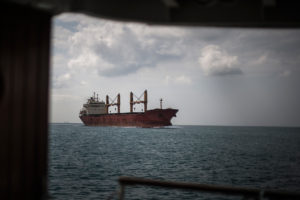Editor’s Note: It is great to see some investors understand the need for an eLoran system to enable shipping to be safer and more efficient. Would be good if we had empowered people with his vision in the right places in government.
Brian Ladin of Delos Shipping Shares Viewpoint on eLoran

plainpicture/ Tilby Vattard
(Newswire.net — August 16, 2017) Dallas, Texas — Alarmed by the series of threats that have jeopardized international vessels and ships, the marine and shipping industries in the United States and the rest of the world unequivocally agree: there is a need for an alternate navigation technology to combat the attacks.
As a major industry player, Brian Ladin affirms the importance of employing a more secure navigation system that effectively deters the threats. For his marine investment firm Delos Shipping that deals with investments on ships and vessels on a daily basis, the fact cannot be overstated.
Statistically, roughly 90% of world trade utilizes sea transport. Unlike aircraft, ships do not have a back-up navigation system. When their GPS stops functioning, companies risk collision on the waters or running onto and getting stuck on land—not exactly the kind of journey businessmen and investors expect. To learn more about Brian, visit here.
Just this year, South Korean fishing vessels, A.P. Moller-Maersk and a ship in the Black Sea along with 20 more encountered serious signal issues. After an extensive investigation and much deliberation, experts believed that hackers apparently tried to access the vessels’ systems which, apparently, were not invulnerable to cyberattacks.
The answer, according to authorities in the field, is reminiscent of the high-value World War II navigation instrument produced and utilized by the U.S., the Enhanced Long-Range Navigation. The development of the eLORAN, as spearheaded by South Korea, is essentially hinged on an enhanced version of the LORAN as an advanced hyperbolic radio navigation system. Its major features include top-value receiver-transmitter for improved navigation accuracy and precision; usefulness for securing a vessel in the event of degraded or unavailable GPS; and pulses for transmitting DGPS corrections and other auxiliary data.
The eLORAN is reported to have an average signal that is estimated to be “1.3 million times stronger than a GPS signal” and it will entail a heavily powered transmitter, massive and powerful antenna to detect, spoof or jam it.

